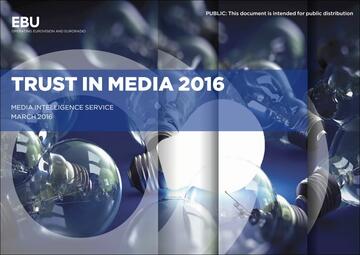
EBU - Trust in Media 2016
Based on the data published in the 84th Eurobarometer survey , this report considers the level of trust towards different types of media in EU Member States as well as acceding and candidate countries.
Trust is defined as an individual’s perception of the reliability of media, and it is the result of socio-economic conditions and education, specific events and long-standing perceptions: media organizations can work to increase trust on a mid- and long-term basis by championing credibility and authenticity, however, the results will not only be related to their performance and values but also to external factors beyond the organizations’ control, e.g. cultural or economic aspects.
The types of media included are television, radio, the written press, the Internet, and since 2014, also online social networks.
The results show that radio is the most trusted medium in Europe (in 20 out of 33 countries; 55% of citizens trust radio), while TV is generally the most trusted in south-eastern Europe. The lowest level of trust is recorded for written press (50% distrust) and online social media (55% distrust). Overall, a general negative trend is noted: trust decreased across all media during the last 5 years.
From the 28 EU member states Cyprus, Hungary, and Slovenia scored a negative trust index across all five measured media sectors. Acceding and candidate countries typically experienced lower levels of trust in media, except for Albania, which enjoys one of the highest levels of trust in media overall.
Tags: Trust in mediaThe content of this article can be used according to the terms of Creative Commons: Attribution-NonCommercial 4.0 International (CC BY-NC 4.0) . To do so use the the wording "this article was originally published on the Resource Centre on Media Freedom in Europe" including a direct active link to the original article page.

